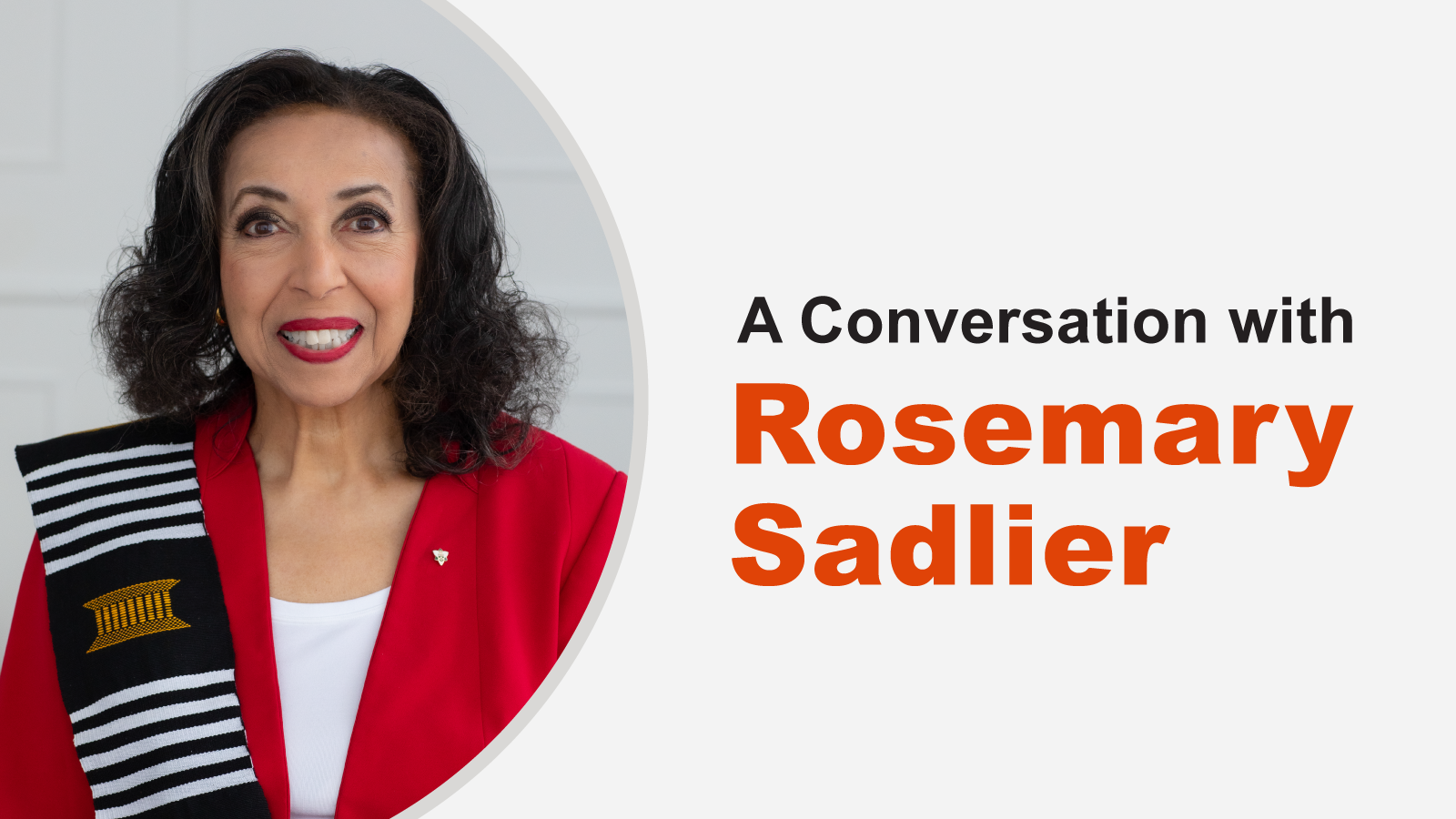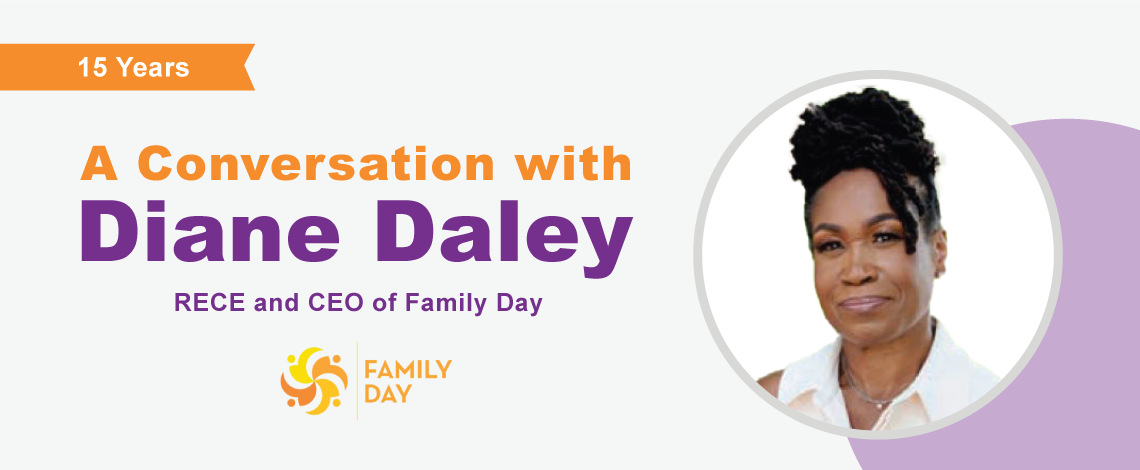Employer Newsletter – Winter 2024

Celebrating Black History: A Conversation with Rosemary Sadlier
February was formally recognized as Black History Month by the Government of Canada in December 1995, following the advocacy of Rosemary Sadlier, O. Ont. (Order of Ontario) in collaboration with the Honourable Dr. Jean Augustine P.C., C.M., O.Ont., C.B.E.
A former public Council member of the College, Rosemary Sadlier is a social justice advocate, researcher, writer, DEI consultant, and international speaker on Black history, anti-racism and women’s issues. She has also served as president of the Ontario Black History Society for over 22 years.
Black History Month provides an opportunity for all of us to deepen our understanding of Black history, celebrate Black cultures and promote inclusivity in the workplace. As employers and partners in the early learning sector, the work that you do and the decisions you make affect thousands of RECEs, and through them, hundreds of thousands of children and families across Ontario.
We sat down with Rosemary for her insights on Black history and to explore ways to educate ourselves, acknowledge the continuing realities of systemic racism, celebrate Black achievements and support RECEs in their learning and practice. We encourage you to share this article with RECE staff, colleagues and coworkers.
Thank you for your time, Rosemary. Let’s begin by talking about the intentions behind Black History Month.
Black History Month is an invitation for everyone to commemorate the achievements of Black Canadians from all periods of Black history, while acknowledging the ongoing realities of anti-Black racism.
While Black History Month was intended to be a time for learning and reflecting on Black history and heritage, and for celebrating milestones, it’s important to be mindful that learning is a journey that is lifelong. Black History Month was never meant to be the only time we focus on or acknowledge “Blackness.”
Many RECEs, through their education and practice, are mostly influenced by Eurocentric scholars and educators. Why is it important for RECEs to learn about teachings and experiences beyond these perspectives, including those of Black scholars and educators, in their work with children and families?
We are all part of systems that have focused in most cases on the work, perspective, values and ideas of Eurocentric scholars and educators. This is particularly the case if you attended primary and high school in this country, come from a colonized country that followed a British/European curriculum, or were educated in Europe. Historically, education has also been delivered by academics and educators who likely originated from one racial background and often from one gender. The very specific education and practice of our RECEs is formed from that core basis of knowledge.
It’s important for RECEs to learn about teachings and experiences beyond these perspectives because we are dealing with diversity at its earliest stages: a diversity of children, of cultural backgrounds, of homes. The children in our care may come from a home environment where there is not just one race, or where different norms are followed.
On the other hand, if we have a situation where all of the children in our care happen to be white and perhaps from the same cultural background, wouldn’t it be a disservice if we did not broaden their horizons, so that later in life, when these children come across new neighbours, new classmates, new colleagues, they would not be surprised encountering people who hold different values and do not look like them?
To prepare young people for the lives they will go on to live with others — is this not the very essence of being an RECE? If we have children of African origin in our care, how do we affirm them in their own identities and their own realities if we ourselves are not familiar with some of what that might mean?
What role can RECEs play in the teachings and discussions on issues including Black history and anti-racism?
I am so excited and happy for the role that RECEs can play in the teaching and discussion on Black history, racism, skin colour, identity and social justice matters. Beyond the families of the children we have in our care, RECEs are likely the most influential person that the child will encounter. Similar to a parent, an RECE’s words and behaviours can build them up or tear them down. What do we want in our future? Do we want children who are strong, confident and caring, or do we want children who continue to hold onto views that no longer serve their growth, nor the advancement of a progressive society? There is a professional responsibility for an RECE, and for all professionals, to continue to learn and build our practice, and this is an additional way to do so.
What is Black joy? How do you bring Black joy in early learning settings? What does that look like?
Is Black joy different than joy in general? In a way, it is. Any child can be happy because there is ice cream and/or pizza, or some special treat that they might be offered, a special trip that might be exciting.
But what is Black joy? That’s when a person can enjoy and “be” and celebrate who they are in their own reality! Black children deal with the reality of microaggressions and lack of representation on a daily basis. When the texture of their hair is not a cause for ridicule, when the width of their nose is not subject to joking, when the colour of their skin is seen as beautiful, when they are accepted as they are, without concern for negative comments from others — that is Black joy! It is the security of being.
Black joy can also be supported in ongoing efforts to display Black people doing fun and loving activities, or figures from Black history like Harriet Tubman, Mary Ann Shadd or Josiah Henson. There are books that can be read aloud or music that reflects many backgrounds and cultural traditions. RECEs can allow themselves, and the children they interact with, time for reflection and learning all year long
What resources and support are available to RECEs to incorporate learnings on Black history in their practice or day-to-day work?
For RECEs who are looking to build their education on Black history and anti-racism, there are supports available. Here are a few I would recommend.

Celebrating 15 years!
The College of Early Childhood Educators celebrates its 15th anniversary on February 14. In recognition of this milestone, we spoke with Diane Daley RECE and CEO of Family Day, to gain an employer’s perspective on the regulation of the early childhood education profession and its impact on the sector. Family Day, which has been serving families and communities for more than 170 years, is one of Toronto’s largest and oldest not-for-profit, multi-site, multi-service, early learning, child care and family support agencies.
Diane has worked progressively in the sector at all levels for more than 25 years. She is passionate about access, equity and social inclusion, and believes that families and communities thrive when their perspectives are included and embraced. She’s an advocate for inclusive, high-quality early learning and childcare programs.
Thank you for taking the time to speak with us, Diane. Your organization has been serving children, families, and communities since long before the profession was regulated. How did the transition to regulation of the early childhood education profession change the nature of your services?
The transition to the regulation of the profession provided an opportunity to streamline and strengthen processes within Family Day. It supported the establishment of clear and consistent standards of professional practice and expectations for educators.
Regulation supported and enabled us with a more standardized approach to recruitment, job descriptions development, and staff performance and learning plans. It also aligned with us on the expectations and accountability related to compliance under the Ministry of Education, from a reporting perspective. Our agency uses the resources on the [College] website to support staff development. As a multi-site, multi-service agency, this consistency plays a critical role in guiding service delivery.
Over the years, how have you helped communicate to families that RECEs are accredited, accountable professionals who must demonstrate leadership and integrity?
We certainly reiterate the College’s messages related to the professional role of educators and their accountability to the public in supporting the well-being and protection of children. These key messages are captured in our parent handbook and program statement. Our policies and operational principles align with these expectations.
How has the perception of the early childhood education profession changed amongst educators, parents or the public over the past 15 years?
I believe that there has been shift in terms of a greater awareness around accountability. The Standards of Practice, Code of Ethics, and Continuous Professional Learning (CPL) expectations have been instrumental in changing the perceptions of the profession for families and educators. Educators are now clearly accountable to the public. These are great steps.
However, significant work is still required to increase public awareness of the profession. The sector continues to navigate a chronic workforce shortage. Addressing compensation to ensure that educators are compensated for their skills, knowledge and contributions is critical to advancing the profession and bringing about a change in public perception.
As an employer, how do you foster a supportive environment and one of ongoing growth and professional development for the RECEs at your organization?
There are many ways that Family Day fosters a supportive environment that facilitates ongoing professional development (PD) and learning. Paid onboarding training is provided for all new staff. Educators are given many opportunities to participate in workshops throughout the year, and we offer two professional development days a year to support the CPL expectations of the College. They can use these days at their discretion. We approach all training ensuring a lens of diversity, equity and inclusion, to reduce barriers for staff. As a multi-site agency, we also support and encourage career growth. The agency has integrated opportunities for mentoring and coaching for staff. Combined with the training and development available, educators have many opportunities to gain more experience and grow their career.
____________________
Learn more about Family Day Care Services here.